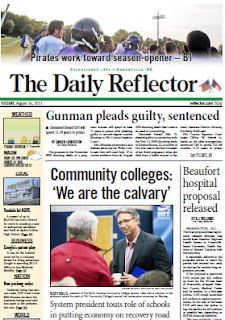That minx!
Hurricane Irene sloshed and blew her way ashore early Saturday at the southeastern coast, bringing localized flooding, downed trees, power outages and contributing to a possible drowning.
No. Hurricane Irene might have sloshed and blown its way ashore, but it did not blow her way ashore, because tropical cyclones don't have gender, and we have neuter pronouns for the very purpose of describing things like hurricanes without sounding -- well, antediluvian.
Even the AP Stylebook, hardly on the cutting edge of inclusive language, has said so from the outset. This is from 1977, the first year the Stylebook appeared as a full-size guide to normative news language (and two years before Atlantic hurricanes first got male names*):
... Use it and its -- not she, her or hers -- in pronoun references. And do not use the presence of a woman's name as an excuse to attribute sexist images of women's behavior to a storm. Avoid, for example, such sentences as: The fickle Hazel teased the Louisiana coast.**
Good point. The AP won't come right out and say it, but you're pretty much "attributing sexist images" as soon as you use the gendered pronoun. Might as well go ahead and write the way the grownups do.
I don't mean to suggest that AP style is handed down from Sinai, or that it's always better than house style, or that good writers should be broken on the wheel of the stylebook until all the creativity is drained from them. I would suggest that people who mistake knee-jerk sexism for creativity are probably missing the point from the outset.
* I'd be remiss if I didn't point out that I still have an especially delightful Durham Herald hed in my collection from that period: "Floridians Alerted to Eye Lusty Fred"
** Except for the addition of male pronouns to the caution list (not that I can think of any cases of stereotypical male behavior to tropical weather over the past three decades), the entry is basically unchanged since 1977 -- Hurricane Hazel and all. It's sometimes interesting to reflect on how much the AP still lives in the three-channel world.















